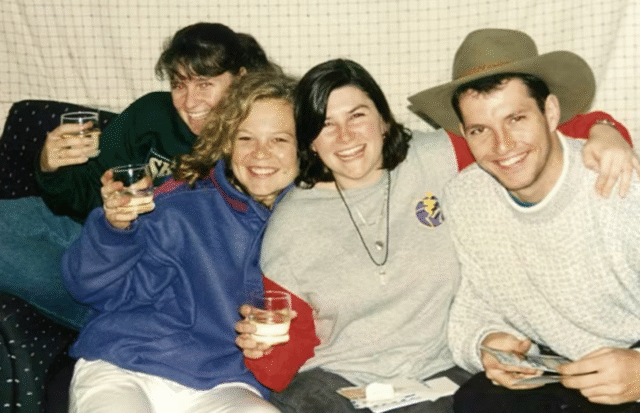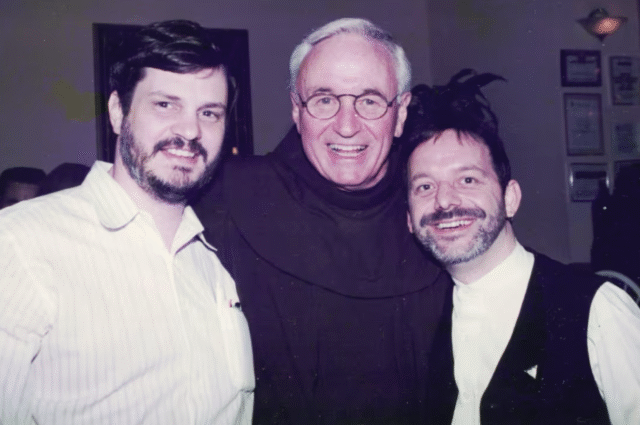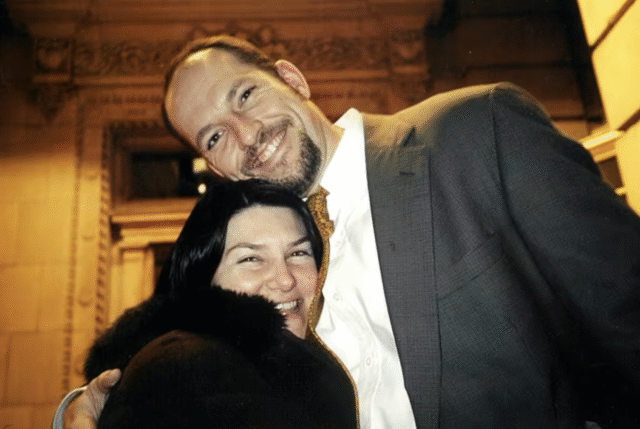September 11, 2001, is etched in history as one of America’s darkest days – four planes hijacked, the Twin Towers and the Pentagon attacked, and a final cockpit struggle ending in a field in Pennsylvania. Amid the horror, tragedy, and chaos, two men rose to courage, exemplifying heroism with quiet clarity: Mark Bingham and Father Mychal Judge. Though markedly different in background — Bingham, 31, a brawny, spirited public relations professional; Judge, 68, a Franciscan priest of deep compassion — both were gay, both embraced their truths, and both made the ultimate sacrifice.
Acts of Sacrifice and Service
Mark Bingham: A former college rugby star who joined Todd Beamer, Tom Burnett, and Jeremy Glick in resisting the hijackers aboard United Flight 93, Bingham helped thwart the plane’s intended target, likely the White House or the U.S. Capitol, steering it instead into a Pennsylvania field. According to the 9/11 Commission Report, their revolt saved countless lives.
He found a moment to call his mother, Alice Hoagland, expressing love before the call cut out. As she told the Iowa City Press-Citizen in 2019, “I only got three minutes with him and when I tried to call back, I couldn’t get through.”

Father Mychal Judge: The FDNY chaplain and friar rushed to Ground Zero immediately after the first tower fell. Ministering to victims and rescue workers, he entered the North Tower and administered last rites while praying, “God, please end this,” according to The Irish Times. Moments later, debris from the collapsing South Tower struck him, he became the first certified fatality of 9/11.
Two Lives of Light and Laughter
Despite their demises being two decades ago, those who knew Bingham and Judge speak vividly of their warmth, humor, and joy.
Brendan Fay, LGBTQ activist and friend of Judge, remembers, “He had a bursting‑at‑the‑sides sense of humor. He loved to sing and was a real jokester, with a laugh that would fill a room.”
Amanda Mark, Bingham’s longtime roommate and friend, recalled his exuberance: during college, he once drunkenly ran onto the field to tackle the opposing team’s mascot. “He was the life of the party.” Bingham’s boisterous energy and lightheartedness were hallmarks of his personality until the end.
Living and Loving Authentically
Their sexual identities were shaped by very different social and institutional landscapes, yet both navigated their paths with dignity.

Bingham’s journey: Coming out first to his fraternity brothers and mother, he remained selectively out — cautious about work exposure and media. Even while playing in a gay rugby league in San Francisco, “his face was blurred in photos in the local press.”
Biographer Jon Barrett noted in the preface to Hero of Flight 93 that, “San Francisco didn’t serve as a beacon for him as it had to so many others… he lived there by default.”
But among his confidants, he dreamed boldly. Mark remembered a moment he shared after moving to New York: Bingham confessed his ambition was “to write the Great American Novel — but gay.” He continued, “So that you’d have to read it in high school, and people would understand that gay people were always among us and were totally normal and a part of our lives.”
Judge’s quiet courage: Judge was “selectively out,” as Fay described, open to friars and trusted friends but not in the public sphere. He wielded his ministry as his voice, quietly championing LGBTQ people during the AIDS crisis, even when it defied church norms.
He offered sacraments to LGBTQ Catholics, aided PFLAG and DignityUSA, and supported inclusive events like the St. Pat’s for All parade. Fay said, “Mychal Judge took risks. He pushed boundaries … he figured out how to weave around and do what he felt needed to be done without suffering the wrath of the church.”
Legacies Alive Today
Bingham’s Legacy: The Bingham Cup
In 2002, less than a year after his death, the inaugural Mark Kendall Bingham Memorial Tournament, or Bingham Cup, was held in San Francisco. Organized by International Gay Rugby (IGR), it gathered inclusive rugby teams in honor of Bingham’s legacy. Alice Hoagland presented the trophy — a fitting tribute.
Since then, the Bingham Cup has grown globally: in 2018 alone, 74 teams from 20 countries competed. The tournament now stands as the world’s largest amateur gay and inclusive rugby championship
Participants and fans recall its profound impact:
Jeffrey Thorpe of the Atlanta Bucks told CNN: “Bingham is someone who is really respected,” and that Bingham’s story helped “mitigate the homophobia gay athletes often encounter.”

Former teammate Chris Zerlaut shared in a documentary, “When you have hundreds of people come up to you and say: ‘I was on the verge of suicide, Mark changed my life. I had no family. Now, I do.’ — it’s amazing.”
Hoagland remains a constant presence at the tournaments, described by organizers as “a mother to us all,” and lasting gratitude from players who see her as a symbol of love beyond biology.
Judge’s Legacy: A Silent Canonization
Father Judge’s legacy is more nuanced. A growing movement champions him for sainthood — not as a martyr, but an “offerer of life,” someone who sacrificed himself in service. Vatican official Rev. Luis Escalante suggested this new path to priest Francis DeBernardo, who leads New Ways Ministry
Jesuit priest Rev. James Martin said, “Mychal Judge shows us that you can be gay and holy,” and that “Father Judge’s selflessness is a reminder of the sanctity that the church often overlooks in LGBTQ people.”
New Ways Ministry made a call in 2021 for grassroots advocates to form a formal canonization committee, noting that Judge’s life of service transcends labels.
Online, LGBTQ Catholics express their own reverence. One user wrote, “What a wonderful Man he was and he touched so many lives. It cannot have been easy being a Catholic Priest and Gay back in the day either. He really does come across as selfless.” Reddit Another called Judge their “uncanonized patron saint,” citing him as a queer chaplain and firefighter who affirmed their identity.
Reflections on Identity, Faith, and Bravery
Mark Bingham and Father Mychal Judge did more than die bravely. They represented facets of identity and integrity seldom visible in their time — queerness paired with courage, visibility with humility, faith with authenticity.
As Father Judge ran toward the flames to bless and console, he embodied a gospel of inclusion that few dared to whisper. As Bingham powered onto a turbulent cockpit, he affirmed that gay men can be protectors, fighters, heroes.
In the years since, their names have become symbols – Bingham on the rugby pitch, Judge in hearts seeking spiritual belonging. Both represent different dimensions of belonging: one in sporting kinship, one in spiritual embrace.
Remembering and Continuing Their Work
Today, their legacies invite us to acknowledge the fullness of LGBTQ lives, to honor heroes without erasure.
The Bingham Cup continues, next set for Brisbane in 2026, showing how sport becomes a place of identity and community.
In religious spheres, conversations about LGBTQ inclusion carry Judge’s memory. Advocates are urged not to see his sexuality as a barrier but as integral to his empathy and ministry.
In both cases, an unanswered question remains: how many other LGBTQ heroes went uncounted?
Alice Hoagland once said, “Sexual orientation didn’t matter at all, what mattered was character and strength and courage. Mark showed that in abundance and I think every gay man or women can be inspired to do the same thing.”
On September 11, 2001, two men faced unimaginable chaos — one on a plane, one in a collapsing tower, and they responded with selfless courage. Their actions that day stemmed from lives lived with authenticity, empathy, and ardor.
Mark Bingham, the great connector, the wanted-to-write-a-gay-Great-American-Novelist guy, remains the soul of inclusive sport — his memory unites players and communities worldwide.
Father Mychal Judge, the tenderhearted friar, continues as a beacon for LGBTQ people of faith — his life bridges divisions that too often remain unaddressed.
Every September 11, let us remember not only the collective tragedy but the individuals who embodied hope in its midst.



